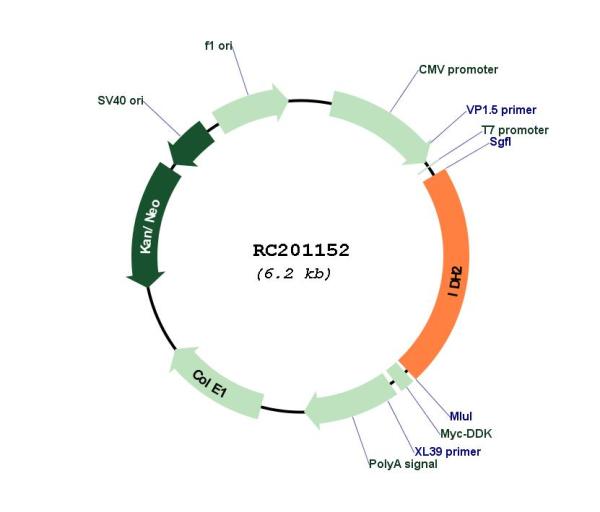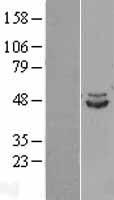IDH2 (NM_002168) Human Tagged ORF Clone
CAT#: RC201152
IDH2 (Myc-DDK-tagged)-Human isocitrate dehydrogenase 2 (NADP+), mitochondrial (IDH2), nuclear gene encoding mitochondrial protein
ORF Plasmid: tGFP
"NM_002168" in other vectors (6)
Need custom modification / cloning service?
Get a free quote
CNY 5,488.00
| Cited in 6 publications. |
CNY 300.00
CNY 1,999.00
CNY 4,070.00
Specifications
| Product Data | |
| Type | Human Tagged ORF Clone |
| Tag | Myc-DDK |
| Synonyms | D2HGA2; ICD-M; IDH; IDHM; IDP; IDPM; mNADP-IDH |
| Vector | pCMV6-Entry |
| E. coli Selection | Kanamycin (25 ug/mL) |
| Mammalian Cell Selection | Neomycin |
| Sequence Data |
>RC201152 ORF sequence
Red=Cloning site Blue=ORF Green=Tags(s) TTTTGTAATACGACTCACTATAGGGCGGCCGGGAATTCGTCGACTGGATCCGGTACCGAGGAGATCTGCC GCCGCGATCGCC ATGGCCGGCTACCTGCGGGTCGTGCGCTCGCTCTGCAGAGCCTCAGGCTCGCGGCCGGCCTGGGCGCCGG CGGCCCTGACAGCCCCCACCTCGCAAGAGCAGCCGCGGCGCCACTATGCCGACAAAAGGATCAAGGTGGC GAAGCCCGTGGTGGAGATGGATGGTGATGAGATGACCCGTATTATCTGGCAGTTCATCAAGGAGAAGCTC ATCCTGCCCCACGTGGACATCCAGCTAAAGTATTTTGACCTCGGGCTCCCAAACCGTGACCAGACTGATG ACCAGGTCACCATTGACTCTGCACTGGCCACCCAGAAGTACAGTGTGGCTGTCAAGTGTGCCACCATCAC CCCTGATGAGGCCCGTGTGGAAGAGTTCAAGCTGAAGAAGATGTGGAAAAGTCCCAATGGAACTATCCGG AACATCCTGGGGGGGACTGTCTTCCGGGAGCCCATCATCTGCAAAAACATCCCACGCCTAGTCCCTGGCT GGACCAAGCCCATCACCATTGGCAGGCACGCCCATGGCGACCAGTACAAGGCCACAGACTTTGTGGCAGA CCGGGCCGGCACTTTCAAAATGGTCTTCACCCCAAAAGATGGCAGTGGTGTCAAGGAGTGGGAAGTGTAC AACTTCCCCGCAGGCGGCGTGGGCATGGGCATGTACAACACCGACGAGTCCATCTCAGGTTTTGCGCACA GCTGCTTCCAGTATGCCATCCAGAAGAAATGGCCGCTGTACATGAGCACCAAGAACACCATACTGAAAGC CTACGATGGGCGTTTCAAGGACATCTTCCAGGAGATCTTTGACAAGCACTATAAGACCGACTTCGACAAG AATAAGATCTGGTATGAGCACCGGCTCATTGATGACATGGTGGCTCAGGTCCTCAAGTCTTCGGGTGGCT TTGTGTGGGCCTGCAAGAACTATGACGGAGATGTGCAGTCAGACATCCTGGCCCAGGGCTTTGGCTCCCT TGGCCTGATGACGTCCGTCCTGGTCTGCCCTGATGGGAAGACGATTGAGGCTGAGGCCGCTCATGGGACC GTCACCCGCCACTATCGGGAGCACCAGAAGGGCCGGCCCACCAGCACCAACCCCATCGCCAGCATCTTTG CCTGGACACGTGGCCTGGAGCACCGGGGGAAGCTGGATGGGAACCAAGACCTCATCAGGTTTGCCCAGAT GCTGGAGAAGGTGTGCGTGGAGACGGTGGAGAGTGGAGCCATGACCAAGGACCTGGCGGGCTGCATTCAC GGCCTCAGCAATGTGAAGCTGAACGAGCACTTCCTGAACACCACGGACTTCCTCGACACCATCAAGAGCA ACCTGGACAGAGCCCTGGGCAGGCAG ACGCGTACGCGGCCGCTCGAGCAGAAACTCATCTCAGAAGAGGATCTGGCAGCAAATGATATCCTGGATT ACAAGGATGACGACGATAAGGTTTAA >RC201152 protein sequence
Red=Cloning site Green=Tags(s) MAGYLRVVRSLCRASGSRPAWAPAALTAPTSQEQPRRHYADKRIKVAKPVVEMDGDEMTRIIWQFIKEKL ILPHVDIQLKYFDLGLPNRDQTDDQVTIDSALATQKYSVAVKCATITPDEARVEEFKLKKMWKSPNGTIR NILGGTVFREPIICKNIPRLVPGWTKPITIGRHAHGDQYKATDFVADRAGTFKMVFTPKDGSGVKEWEVY NFPAGGVGMGMYNTDESISGFAHSCFQYAIQKKWPLYMSTKNTILKAYDGRFKDIFQEIFDKHYKTDFDK NKIWYEHRLIDDMVAQVLKSSGGFVWACKNYDGDVQSDILAQGFGSLGLMTSVLVCPDGKTIEAEAAHGT VTRHYREHQKGRPTSTNPIASIFAWTRGLEHRGKLDGNQDLIRFAQMLEKVCVETVESGAMTKDLAGCIH GLSNVKLNEHFLNTTDFLDTIKSNLDRALGRQ TRTRPLEQKLISEEDLAANDILDYKDDDDKV |
| Chromatograms |
CHROMATOGRAMS
 Sequencher program is needed, download here. |
| Restriction Sites |
SgfI-MluI
Cloning Scheme for this gene
Plasmid Map

|
| ACCN | NM_002168 |
| ORF Size | 1356 bp |
| OTI Disclaimer | Due to the inherent nature of this plasmid, standard methods to replicate additional amounts of DNA in E. coli are highly likely to result in mutations and/or rearrangements. Therefore, OriGene does not guarantee the capability to replicate this plasmid DNA. Additional amounts of DNA can be purchased from OriGene with batch-specific, full-sequence verification at a reduced cost. Please contact our customer care team at custsupport@origene.com or by calling 301.340.3188 option 3 for pricing and delivery. The molecular sequence of this clone aligns with the gene accession number as a point of reference only. However, individual transcript sequences of the same gene can differ through naturally occurring variations (e.g. polymorphisms), each with its own valid existence. This clone is substantially in agreement with the reference, but a complete review of all prevailing variants is recommended prior to use. More info |
| OTI Annotation | This clone was engineered to express the complete ORF with an expression tag. Expression varies depending on the nature of the gene. |
| Product Components | The ORF clone is ion-exchange column purified and shipped in a 2D barcoded Matrix tube containing 10ug of transfection-ready, dried plasmid DNA (reconstitute with 100 ul of water). |
| Reconstitution | 1. Centrifuge at 5,000xg for 5min. 2. Carefully open the tube and add 100ul of sterile water to dissolve the DNA. 3. Close the tube and incubate for 10 minutes at room temperature. 4. Briefly vortex the tube and then do a quick spin (less than 5000xg) to concentrate the liquid at the bottom. 5. Store the suspended plasmid at -20°C. The DNA is stable for at least one year from date of shipping when stored at -20°C. |
| Note | Plasmids are not sterile. For experiments where strict sterility is required, filtration with 0.22um filter is required. |
| Reference Data | |
| RefSeq | NM_002168.4 |
| RefSeq Size | 1818 bp |
| RefSeq ORF | 1359 bp |
| Locus ID | 3418 |
| UniProt ID | P48735 |
| Domains | isodh |
| Protein Pathways | Citrate cycle (TCA cycle), Glutathione metabolism, Metabolic pathways |
| MW | 50.9 kDa |
| Gene Summary | Isocitrate dehydrogenases catalyze the oxidative decarboxylation of isocitrate to 2-oxoglutarate. These enzymes belong to two distinct subclasses, one of which utilizes NAD(+) as the electron acceptor and the other NADP(+). Five isocitrate dehydrogenases have been reported: three NAD(+)-dependent isocitrate dehydrogenases, which localize to the mitochondrial matrix, and two NADP(+)-dependent isocitrate dehydrogenases, one of which is mitochondrial and the other predominantly cytosolic. Each NADP(+)-dependent isozyme is a homodimer. The protein encoded by this gene is the NADP(+)-dependent isocitrate dehydrogenase found in the mitochondria. It plays a role in intermediary metabolism and energy production. This protein may tightly associate or interact with the pyruvate dehydrogenase complex. Alternative splicing results in multiple transcript variants. [provided by RefSeq, Feb 2014] |
Citations (6)
| The use of this cDNA Clones has been cited in the following citations: |
|---|
|
Replication Study: The common feature of leukemia-associated IDH1 and IDH2 mutations is a neomorphic enzyme activity converting alpha-ketoglutarate to 2-hydroxyglutarate
,Showalter, MR;Hatakeyama, J;Cajka, T;VanderVorst, K;Carraway, KL;Fiehn, O;, ;,
Elife
,PubMed ID 28653623
[IDH2]
|
|
IDH2 Mutations Define a Unique Subtype of Breast Cancer with Altered Nuclear Polarity
,Chiang, S;Weigelt, B;Wen, HC;Pareja, F;,
Cancer Research
,PubMed ID 27913435
[IDH2]
|
|
Registered report: The common feature of leukemia-associated IDH1 and IDH2 mutations is a neomorphic enzyme activity converting alpha-ketoglutarate to 2-hydroxyglutarate
,Fiehn, O;Showalter, MR;Schaner-Tooley, CE;Reproducibility Project: Cancer Biology, ;Reproducibility Project Cancer Biology, ;,
Elife
,PubMed ID 26943899
[IDH2]
|
|
Registered report: IDH mutation impairs histone demethylation and results in a block to cell differentiation
,Richarson, AD;Scott, DA;Zagnitko, O;Aza-Blanc, P;Chang, CC;Russler-Germain, DA;Reproducibility Project: Cancer Biology, ;,
Elife
,PubMed ID 26971564
[IDH2]
|
|
Metabolomic comparison between cells overexpressing isocitrate dehydrogenase 1 and 2 mutants and the effects of an inhibitor on the metabolism
,Wen, H;Cho, HR;Yun, T;Kim, H;Park, CK;Lee, SH;Choi, SH;Park, S;,
J. Neurochem.
,PubMed ID 25251602
[IDH2]
|
|
Elevated CO2 Levels Cause Mitochondrial Dysfunction and Impair Cell Proliferation
,Christine U. Vohwinkel, Emilia Lecuona, Haying Sun, Natascha Sommer, István Vadász, Navdeep S. Chandel, and Jacob I. Sznajder,
J. Biol. Chem., Oct 2011; 286: 37067 - 37076.
[IDH2]
|
Documents
| Product Manuals |
| FAQs |
| SDS |
Resources
Other Versions
| SKU | Description | Size | Price |
|---|---|---|---|
| RC201152L1 | Lenti ORF clone of Human isocitrate dehydrogenase 2 (NADP+), mitochondrial (IDH2), nuclear gene encoding mitochondrial protein, Myc-DDK-tagged |
CNY 7,888.00 |
|
| RC201152L2 | Lenti ORF clone of Human isocitrate dehydrogenase 2 (NADP+), mitochondrial (IDH2), nuclear gene encoding mitochondrial protein, mGFP tagged |
CNY 7,888.00 |
|
| RC201152L3 | Lenti ORF clone of Human isocitrate dehydrogenase 2 (NADP+), mitochondrial (IDH2), nuclear gene encoding mitochondrial protein, Myc-DDK-tagged |
CNY 5,890.00 |
|
| RC201152L4 | Lenti ORF clone of Human isocitrate dehydrogenase 2 (NADP+), mitochondrial (IDH2), nuclear gene encoding mitochondrial protein, mGFP tagged |
CNY 5,890.00 |
|
| RG201152 | IDH2 (tGFP-tagged) - Human isocitrate dehydrogenase 2 (NADP+), mitochondrial (IDH2), nuclear gene encoding mitochondrial protein |
CNY 7,088.00 |
|
| SC319226 | IDH2 (untagged)-Human isocitrate dehydrogenase 2 (NADP+), mitochondrial (IDH2), nuclear gene encoding mitochondrial protein |
CNY 3,656.00 |


 United States
United States
 Germany
Germany
 Japan
Japan
 United Kingdom
United Kingdom
 China
China




